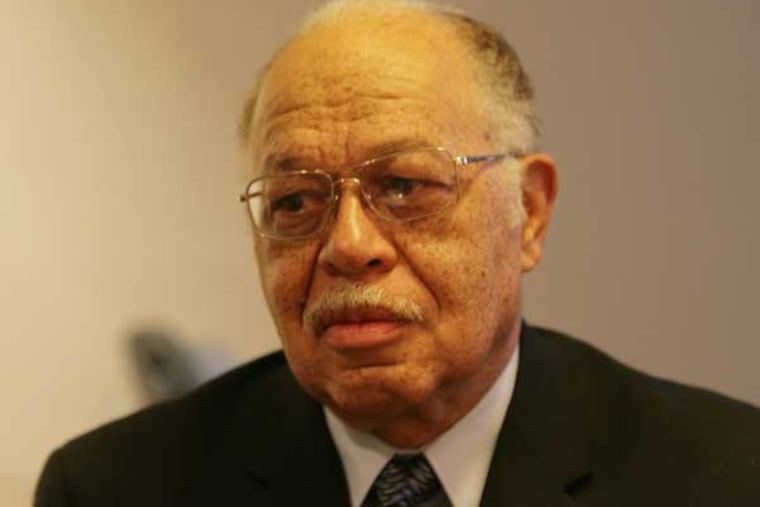Enigmatic Gosnell calls no one in his defense
West Philadelphia abortion doctor Kermit Gosnell, as enigmatic as he was at his arrest two years ago, ended the defense in his murder trial Wednesday without testifying and without presenting a single witness.

West Philadelphia abortion doctor Kermit Gosnell, as enigmatic as he was at his arrest two years ago, ended the defense in his murder trial Wednesday without testifying and without presenting a single witness.
"And with that, your honor, the defense rests," said attorney Jack McMahon, dispatching in a few words five weeks of prosecution evidence alleging that the 72-year-old Gosnell killed babies born alive and viable during illegal late-term abortions.
The afternoon proceeding lasted about two minutes.
Gosnell, a slight smile on his face, said nothing as he was led back into custody to await Monday, when McMahon, the lawyer for codefendant Eileen O'Neill, and Assistant District Attorney Edward Cameron make final arguments to the jury of seven women and five men.
The closings will be followed - likely Tuesday - by legal instructions by Common Pleas Court Judge Jeffrey P. Minehart. The jury then will begin deliberating a long list of charges, including four first-degree murder counts that could expose Gosnell to the death penalty.
Earlier Wednesday, O'Neill, who worked as an unlicensed doctor in the family practice section of Gosnell's Women's Medical Society clinic, also chose not to testify after attorney James Berardinelli had called 13 witnesses over three days.
The Constitution does not require criminal defendants to testify or present evidence, and the judge will tell the jury it may not consider the decision not to testify in reaching a verdict.
For criminal defense lawyers, advising a client whether to testify can be their toughest and most perilous decision.
"There's no hard and fast rule," said Fortunato N. Perri Jr. "As an attorney, you can only advise, and each case is evaluated individually."
Perri, a Center City criminal defense lawyer, said he sometimes advises clients not to testify if he feels prosecutors have not proved the charges beyond a reasonable doubt.
"But at the end of the day, the defendant has the ultimate decision," Perri said.
"It's always a very, very difficult decision as to whether or not to let a defendant take the stand," added L. George Parry, a former prosecutor and veteran defense lawyer.
How will jurors react?
Even when a lawyer advises a client not to testify, Parry said, constitutional guarantees and jury warnings pale compared with the unknown reactions of 12 people.
"It seems to me that if I were a juror, I would want to hear from Dr. Gosnell," Parry said. "I don't care about warnings. . . . It's human nature."
Gosnell is charged with four counts of first-degree murder, of infants prosecutors say he killed after they were born alive in late-term abortions.
If the jury finds him guilty, it would begin hearing evidence to decide if Gosnell should be executed by lethal injection or serve life in prison without chance of parole.
McMahon has argued that none of the fetuses could have survived because all had been given a fatal abortion drug. Any movement in an aborted fetus was involuntary, McMahon argued.
Gosnell is also charged with third-degree murder in the Nov. 19, 2009, death of Karnamaya Mongar, 41, of Virginia. Prosecutors allege that Mongar died during an abortion when Gosnell's untrained staff overdosed her on Demerol, a painkiller he used as anesthesia during abortions.
O'Neill, 56, of Phoenixville, is not charged with performing any abortions, but is accused of participating in the operation of a corrupt organization.
Most of O'Neill's witnesses vouched for her character and reputation for honesty. Many also described her as a talented and caring doctor.
One, Natalie Tursi, 26, was asked to testify about her internship with O'Neill in 2008 at Gosnell's clinic at 3801 Lancaster Ave.
Tursi praised O'Neill's abilities as a doctor and said she followed rules requiring an unlicensed physician to work under a doctor's - Gosnell's - oversight.
Pregnant witness
But what many in court observed was that Tursi was pregnant and had difficulty walking to the witness stand past the array of equipment from Gosnell's abortion procedure room.
Prosecutor Cameron noticed, and in questioning Tursi genially elicited from her that she was in her 22d week.
Throughout the trial, the jury has been told that in Pennsylvania abortions are illegal after 24 weeks and has seen graphic photographs of fetuses aborted by Gosnell both younger and older than Tursi's unborn child.
None of O'Neill's witnesses shed light on why O'Neill, who graduated from medical school and passed her medical licensing board exams, worked without a medical license.
Although the jury was not present, O'Neill herself muddied the waters when she was being questioned by the judge about her decision to not testify.
Answering Minehart's questions about her mental state, O'Neill said she had never been treated for a mental illness.
According to the 2011 grand jury report that recommended criminal charges against O'Neill, Gosnell and eight other clinic employees, O'Neill testified that she had a medical license in Louisiana, where she worked at a Baton Rouge abortion clinic.
O'Neill testified to the grand jury that she relinquished the license in 2000 because of "post-traumatic stress disorder."
Trial witnesses testified that O'Neill began working for Gosnell in 2002 and that he promised to help her obtain a Pennsylvania medical license.
By the time the clinic was raided in February 2010, witnesses said, O'Neill was angry and believed Gosnell had not lived up to his promise.